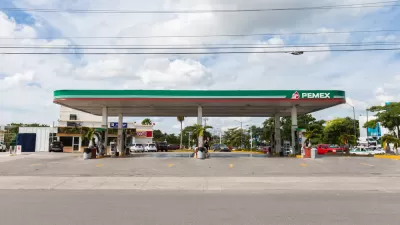Reaction to the 20 percent hike in fuel prices on New Year's Day has been swift, causing riots and looting resulting in four deaths and arrests of over 700 people, but President Enrique Peña Nieto continues to justify the need to end fuel subsidies.
In addition to the looting and fatalities, The Associated Press reports on blockades performed by truckers at ports, highways and terminals. CNN has photos showing the looting of a department store and stealing fuel at a gas station.
While the price hike has been justified by President Enrique Peña Nieto as a "responsible measure for the stability of the economy," according to a government blog, it has led to a great deal of civil unrest. Peña Nieto also emphasized that the price hike is not a result "of the Energy Reform" or increase in taxes, but of an increase in global prices.
I know that allowing gasoline to rise to its international price is a difficult change, but as president, my job is to precisely make difficult decisions now, in order to avoid worse consequences in the future," Pena Nieto said in a televised address. "Keeping gas prices artificially low would mean taking money away from the poorest Mexicans, and giving it to those who have the most."
As posted earlier, the hike is result of energy reform, specifically the deregulation of fuel prices to allow for prices to be determined, in part, by global oil prices. However, the energy reform that Peña Nieto was likely referring to is the 2013 proposal to allow foreign investment in the state-owned oil company, Pemex.
The government blog elaborated on why Peña Nieto needed to end the subsidy of fuel prices from an equity perspective:
He would have had to stop funding programs in the health sector, the education sector , which are priority and which are certainly a priority for the government against which would have meant devote those resources to maintain a fixed price of gasoline.
FULL STORY: Looting, protests in Mexico over gas price hikes turn deadly

Alabama: Trump Terminates Settlements for Black Communities Harmed By Raw Sewage
Trump deemed the landmark civil rights agreement “illegal DEI and environmental justice policy.”

Planetizen Federal Action Tracker
A weekly monitor of how Trump’s orders and actions are impacting planners and planning in America.

Why Should We Subsidize Public Transportation?
Many public transit agencies face financial stress due to rising costs, declining fare revenue, and declining subsidies. Transit advocates must provide a strong business case for increasing public transit funding.

‘Clybourne Park’ Sets Stage for Housing Equity Discussions
Clybourne Park, a play exploring race, real estate, and community tensions, can set the stage for discussion on the lasting impacts of housing discrimination, gentrification, and the fight for affordability.

Understanding Road Diets
An explainer from Momentum highlights the advantages of reducing vehicle lanes in favor of more bike, transit, and pedestrian infrastructure.

New California Law Regulates Warehouse Pollution
A new law tightens building and emissions regulations for large distribution warehouses to mitigate air pollution and traffic in surrounding communities.
Urban Design for Planners 1: Software Tools
This six-course series explores essential urban design concepts using open source software and equips planners with the tools they need to participate fully in the urban design process.
Planning for Universal Design
Learn the tools for implementing Universal Design in planning regulations.
Caltrans
Smith Gee Studio
Institute for Housing and Urban Development Studies (IHS)
City of Grandview
Harvard GSD Executive Education
Toledo-Lucas County Plan Commissions
Salt Lake City
NYU Wagner Graduate School of Public Service



























